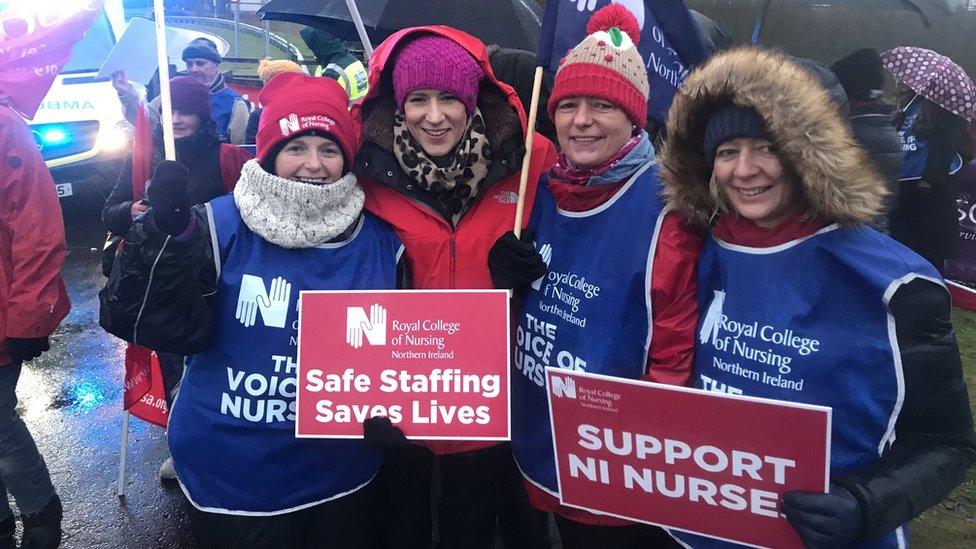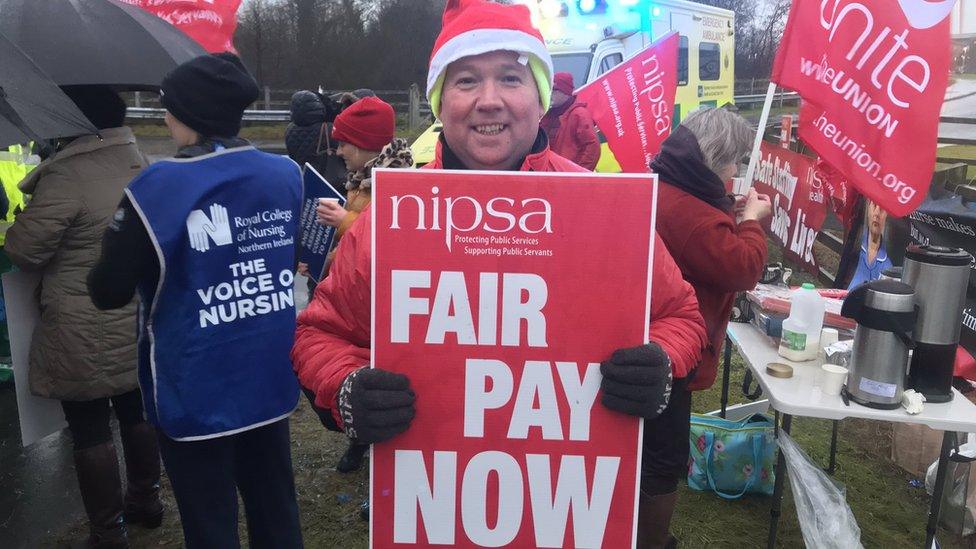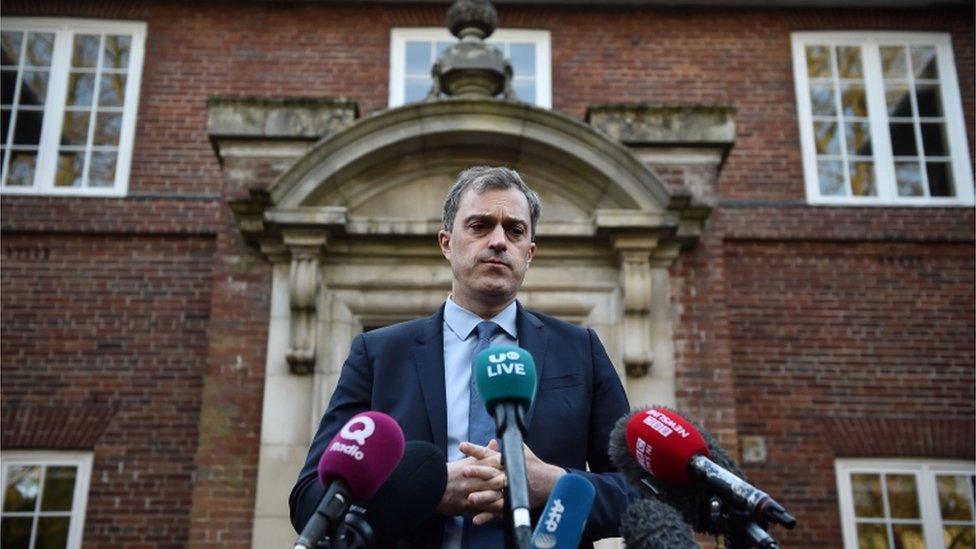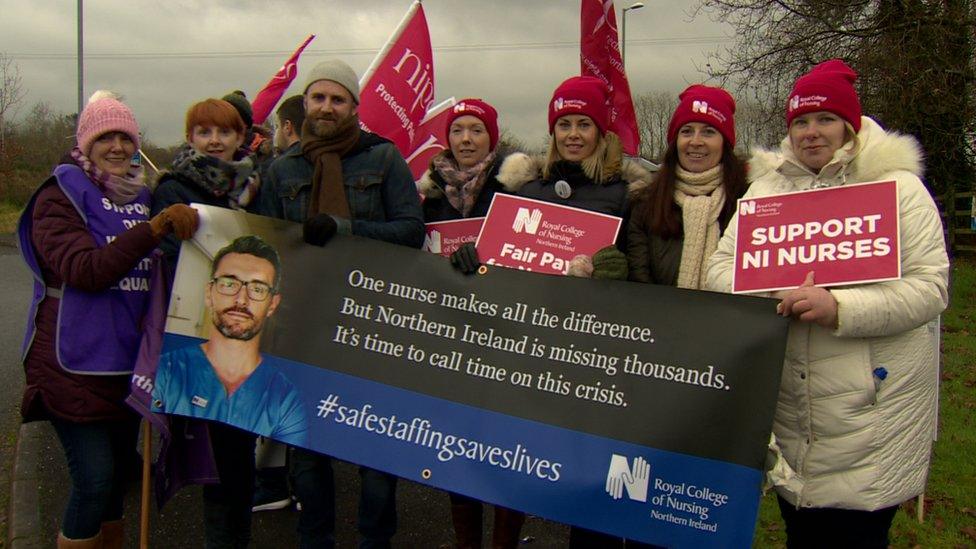Nurses' strike: No easy answers for politicians
- Published

Politicians from all sides have been spotted on picket lines with Northern Ireland's health workers in recent weeks.
As a day of unprecedented strike action takes place, the parties have again signalled their support for health care staff, who are calling for pay parity and safer staffing levels.
While for years there have been calls to take the politics out of health, they are very much still inextricably linked.
When devolved government was operating in Northern Ireland, decisions were taken by individual ministers from different parties at various times regarding the health sector - specifically on pay parity.
But for almost three years, the parties have been absent from Stormont following the collapse of devolution and it has been left to civil servants to hold the fort on health.
Those civil servants say they don't have the power to overturn decisions made by ministers.
Too little, too late?
On Tuesday night, hours before the strike action was due to commence, the five main Stormont party leaders signed a joint letter to the Northern Ireland Secretary Julian Smith, urging him to take control of the issue and order Stormont civil servants to release the additional money that health unions are asking for.
They claimed the letter gave him political "cover" to act over their heads, until Stormont is restored.
It was a moment of unity between the parties - but was deemed too little, too late.
Mr Smith in turn did not agree to meet the five parties to discuss their request, insisting that health remains a devolved matter.
Overnight, another letter was sent back to the party leaders from the head of the civil service, David Sterling, who rejected the parties' request for civil servants to issue the additional money because it is in the "public interest".

Meant to advise, not decide
He told the parties: "This is not simply a question of needing 'political cover' or making a judgement on whether one particular pressing issue would pass a public interest test."
In a way, the collapse of Stormont has perhaps been building to a climax like this.
For years, civil servants have been stymied in terms of decisions they believe they can take without accountable ministers sitting in a power-sharing executive.
Remember, they are meant to advise, not decide.

Four of Stormont's main parties have criticised Julian Smith after refusing to meet with them
As time has passed and Stormont has not returned, those decisions have been piling up and at the top of the list, with huge issues in the health care system.
The parties are all aware of that, but if they couldn't get devolution restored until now, should anyone believe that the health crisis will persuade them back into government?
The Northern Ireland secretary may be banking on that and it might be why he does not seem willing to take the reins this time, despite criticism from the parties that he is using health as a political tool to get devolution restarted.
In October, Mr Smith did take long-awaited legislation through Westminster for victims of Historical Institutional Abuse, in the absence of Stormont.
But this certainly seems different.
Allow X content?
This article contains content provided by X. We ask for your permission before anything is loaded, as they may be using cookies and other technologies. You may want to read X’s cookie policy, external and privacy policy, external before accepting. To view this content choose ‘accept and continue’.
In his letter, Mr Sterling argued any unresolved and controversial issue could then end up being resolved in this way.
And consider this: If Mr Smith did order the civil service to release the extra funding, who then would control and deal with the knock-on effect of that for future Stormont budgets?
'Why not get back into Stormont?'
It is worth saying that Tuesday's letter from the Stormont parties to Mr Smith is not the first time they have united around a specific issue and urged the government to deal with it for them.
They wrote a letter on historical institutional abuse to his predecessor, Karen Bradley, and earlier this year they also sent a letter to Mr Smith, asking him to extend welfare reform mitigations and stop a cliff-edge occurring when the current legislation runs out next March - if they weren't back at Stormont by then.
Allow X content?
This article contains content provided by X. We ask for your permission before anything is loaded, as they may be using cookies and other technologies. You may want to read X’s cookie policy, external and privacy policy, external before accepting. To view this content choose ‘accept and continue’.
But if they can write a joint letter, why not get back into Stormont and deal with it all themselves?
The reality is that governing is much harder.
The former chief of the Health and Social Care Board, John Compton, summed up that view on the Stephen Nolan Show on BBC Radio Ulster when he said: "If you think you can write a letter like this and somehow just govern.. you can't make choices like this just by writing a letter of intent."
The parties may well still hope the government will sort out this particular problem for them - but if Stormont is to have any real chance of returning, eventually they will have to tackle the issues themselves.
- Published17 December 2019

- Published19 December 2019

- Published18 December 2019
